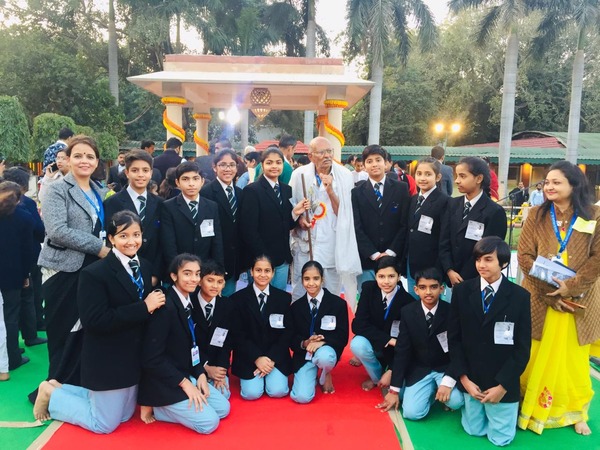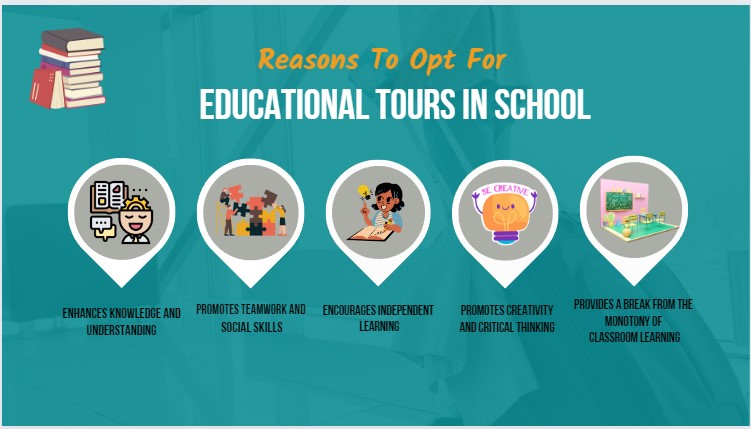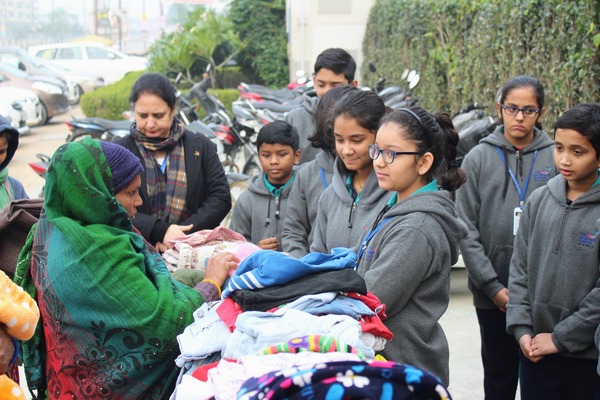Importance of Educational Tours For School Students
Educational tours are a crucial component of the academic program because they give students
the chance to learn outside of the classroom and get useful practical experience. There is a proverb
that goes, “I hear and I forget, I see and I remember, I do and I comprehend,” and it refers to the
idea that seeing something being done in a certain location helps people remember it better.
Reasons To Opt For Educational Tours In Schoo
Here are a few reasons why educational trips are important in schools:
Enhances knowledge and understanding
Educational trips provide students with a chance to learn about a particular place or subject in a more interactive and immersive way. For instance, visiting a historical site or a museum helps students better understand the history and culture of a place.
Promotes teamwork and social skills
Educational trips involve group activities and require students to work together, which helps them develop teamwork skills and social skills. This is crucial for younger pupils because it fosters their confidence and self-worth.
Encourages independent learning
Educational trips require students to be more self-directed and take ownership of their learning. This helps students develop problem-solving skills and become more independent learners.
Promotes creativity and critical thinking
Educational trips provide students with a chance to think creatively and critically about the things they see and experience. This helps students develop their critical thinking skills and become more innovative learners.
Provides a break from the monotony of classroom learning
Educational trips give students a break from the traditional classroom setting and allow them to learn in a more fun and interactive way. This helps to keep students engaged and motivated to learn.
Generally, educational tours in school are a great way for students to learn about different subjects,
cultures, and historical events in a hands-on and interactive way. These tours can take place locally,
nationally, or internationally, depending on the goals and interests of the group. Some examples of
educational tours for school kids might include:
Science and nature tours: These tours take students to museums, zoos, aquariums, or natural habitats to learn about various scientific concepts and the natural world.
Historical tours: These tours take students to historical landmarks and sites, such as battlefields, museums, or cultural centers, to learn about significant events in history and different cultures.
Art and cultural tours: These tours take students to art museums, galleries, or cultural centers to
learn about different artistic styles and cultural traditions.
Community service tours: These tours take students to locations where they participate in
community service projects, such as helping to rebuild homes or assisting with environmental
conservation efforts.
Importance Of Educational Tour
Let’s know why educational tours important for school students:
Exposure to new cultures and environments
Field tours are incredibly enriching and educational for students. Educational tours provide the opportunity for students to learn about different customs, traditions, and ways of life in other countries or regions. These tours are organised to focus on specific subjects, such as history, language, art, or science, or they can be more general in nature, allowing students to experience a wide range of cultural and educational activities.
By participating in an educational tour, students gain first-hand exposure to different cultures, historical sites, and natural landscapes. It helps to broaden their understanding of the world and encourage them to think more critically about the world around them. Educational tours can also provide students with the opportunity to develop important skills such as independence, problem-solving, and teamwork, as they navigate unfamiliar environments and cultures.
Hands-on learning experiences
Educational tours that incorporate interactive learning can be a powerful tool for students to
deepen their understanding of a subject or topic. By actively participating in the learning
process, students are more likely to retain information and develop critical thinking skills.
Additionally, interactive learning can be more engaging and enjoyable for students, making it
a valuable addition to any educational tour.
Development of social skills
skills: Educational tours provide students with the opportunity to interact with their peers and adults in a new setting, helping to develop their social skills and confidence.
Improvement of communication skills
Educational tours require students to communicate and collaborate with their peers and adults, helping to improve their communication skills.
Development of problem-solving skills
Educational tours often involve challenges and unexpected situations that require students to use their problem-solving skills to find solutions.
Enhancement of critical thinking skills
Educational tours encourage students to think critically about the information and experiences they are exposed to, helping to enhance their critical thinking skills.
Increased motivation and engagement
Educational tours provide students with a sense of excitement and adventure, which can lead to increased motivation and engagement in learning.
Development of leadership skills
Educational tours provide students with the opportunity to take on leadership roles and responsibilities, helping to develop their leadership skills.
Building of lifelong memories
In addition to the academic benefits, educational tours also provide an opportunity for students to build lifelong memories. These trips allow students to make new friends, bond with their classmates, and create memories that will stay with them for a lifetime. Hence, educational tours are a valuable educational tool that helps students learn about the world and build lasting memories.
Enhance Academic Performance
During educational tours, students are exposed to a variety of teaching philosophies and discover new perspectives on their fields of study. Students return to the classroom with a deeper connection and greater motivation for their studies when they are able to see, touch, and smell the very things they have learned about in books.
Thus, educational tours are a valuable addition to a student’s education and help them learn
and grow in a variety of ways.
Things to consider when planning for an educational tour
Budget: It is important to consider the cost of the educational tour and ensure that it is within the
school’s budget.
Safety: The safety of the students should be a top priority. Consider the safety measures in place at
the destination, such as emergency procedures, transportation, and accommodations.
Educational value: The tour should offer opportunities for students to learn and engage with new
experiences. Consider the curriculum and how the tour aligns with it.
Student demographics: Take into consideration the needs and abilities of the students, including
physical limitations, language barriers, and special needs.
Teacher involvement: Consider the role of teachers on the tour and how they can contribute to
the educational experience.
Cultural sensitivity: Be mindful of cultural differences and respect local customs and traditions.
Sustainability: Consider the environmental impact of the tour and choose destinations that
prioritize sustainable practices.
Student and parent involvement: Involve students and parents in the planning process and
encourage their input and feedback.
Length of the tour: Consider the length of the tour and whether it is feasible for the students and
teachers.
Pre-tour preparation: Plan activities and materials for before and after the tour to enhance the
the learning experience and provide context for the destination.
We at The Manthan School, Greater Noida West, ensure that our students can reap the benefits of educational tours while following all the safety and other factors. For more information, visit our website: www.themanthanschool.co.in/ or feel free to write to us at info.ne@manthan.edu.in or admission.ne@manthan.edu.in.


